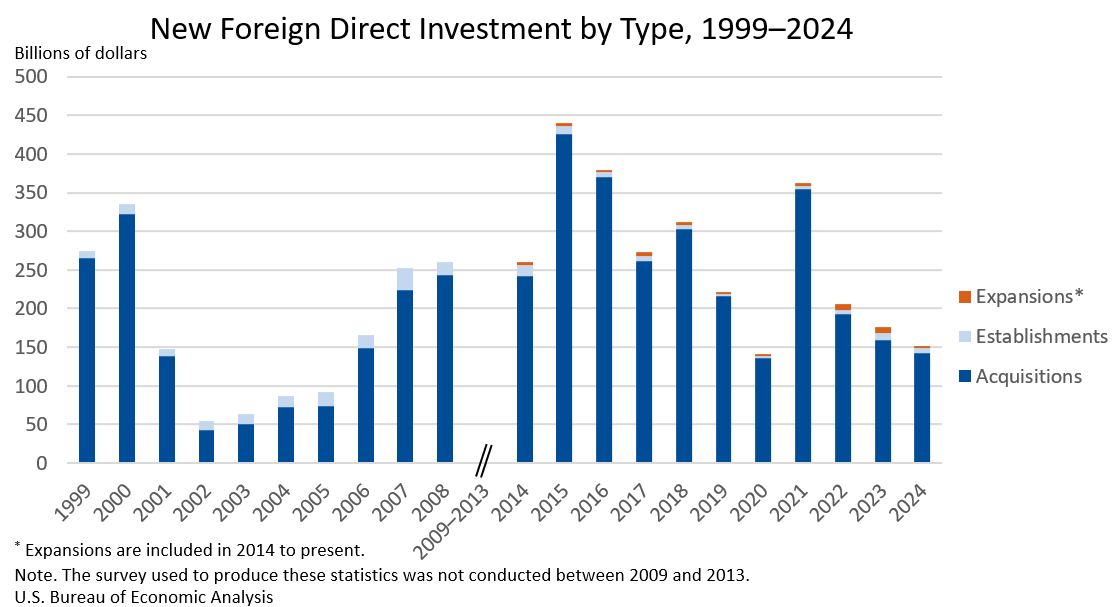Bureau of Economic Analysis
New Foreign Direct Investment in the United States, 2024
Expenditures by foreign direct investors to acquire, establish, or expand U.S. businesses totaled $151.0 billion in 2024, according to preliminary statistics released today by the U.S. Bureau of Economic Analysis. Expenditures decreased $24.9 billion, or 14.2 percent, from $176.0 billion (revised) in 2023 and were below the annual average of $277.2 billion for 2014–2023. As in previous years, acquisitions of existing U.S. businesses accounted for most of the expenditures.
Principal Federal Economic Indicators
Noteworthy
- 2025 News Release Schedule
- Innovation at BEA
- 2025 Annual Updates
- New! Services Trade Data for More Countries
- Data Tool: Trade in Value Added
- Distribution of State Personal Income
- Updated: RIMS II Regional Multipliers
- Arts and Culture
- Space Economy
- FDI Now in State BEARFACTS
- Quick Guide: Price Indexes
The Latest
Activities of U.S. Multinational Enterprises, 2020
Worldwide employment by U.S. multinational enterprises (MNEs) decreased 1.8 percent to 42.4 million workers in 2020 from 43.2 million workers in 2019.
Activities of U.S. Multinational Enterprises, 2020
Worldwide employment by U.S. multinational enterprises (MNEs) decreased 1.8 percent to 42.4 million workers in 2020 (preliminary) from 43.2 million workers in 2019 (revised), according to statistics released today by the U.S. Bureau of Economic Analysis (BEA) on the operations and finances of U.S. parent companies and their foreign affiliates.
Personal Income by County and Metropolitan Area, 2021
In 2021, personal income increased in 3,075 counties, decreased in 36, and was unchanged in 3. Personal income increased 7.4 percent in the metropolitan portion of the United States and 7.7 percent in the nonmetropolitan portion.
Personal Income by County and Metropolitan Area, 2021
In 2021, personal income increased in 3,075 counties, decreased in 36, and was unchanged in 3. Personal income increased 7.4 percent in the metropolitan portion of the United States and 7.7 percent in the nonmetropolitan portion.
Outdoor Recreation Satellite Account, U.S. and States, 2021
The outdoor recreation economy accounted for 1.9 percent ($454.0 billion) of current-dollar gross domestic product (GDP) for the nation in 2021. At the state level, outdoor recreation value added as a share of GDP ranged from 4.8 percent in Hawaii to 1.3 percent in New York and Connecticut. The share was 0.9 percent in the District of Columbia.
Outdoor Recreation Satellite Account, U.S. and States, 2021
The outdoor recreation economy accounted for 1.9 percent ($454.0 billion) of current-dollar gross domestic product (GDP) for the nation in 2021. At the state level, outdoor recreation value added as a share of GDP ranged from 4.8 percent in Hawaii to 1.3 percent in New York and Connecticut. The share was 0.9 percent in the District of Columbia.
September 2022 Trade Gap is $73.3 Billion
The U.S. monthly international trade deficit increased in September 2022 according to the U.S. Bureau of Economic Analysis and the U.S. Census Bureau. The deficit increased from $65.7 billion in August (revised) to $73.3 billion in September, as imports increased and exports decreased. The goods deficit increased $6.6 billion in September to $92.7 billion. The services surplus decreased $1.0 billion in September to $19.5 billion.
U.S. International Trade in Goods and Services, September 2022
The U.S. monthly international trade deficit increased in September 2022 according to the U.S. Bureau of Economic Analysis and the U.S. Census Bureau. The deficit increased from $65.7 billion in August (revised) to $73.3 billion in September, as imports increased and exports decreased. The goods deficit increased $6.6 billion in September to $92.7 billion. The services surplus decreased $1.0 billion in September to $19.5 billion.
Gross Domestic Product for Guam, 2021
Real gross domestic product (GDP) for Guam increased 1.1 percent in 2021 after decreasing 11.4 percent in 2020. The increase in real GDP reflected increases in personal consumption expenditures, government spending, and private fixed investment. These increases were partly offset by a decline in exports of goods and services. Imports, a subtraction item in the calculation of GDP, increased.
Gross Domestic Product for Guam, 2021
Real gross domestic product for Guam increased 1.1 percent in 2021 after decreasing 11.4 percent in 2020, according to statistics released today by the U.S. Bureau of Economic Analysis. These statistics were developed under the Statistical Improvement Program funded by the Office of Insular Affairs of the U.S. Department of the Interior.




